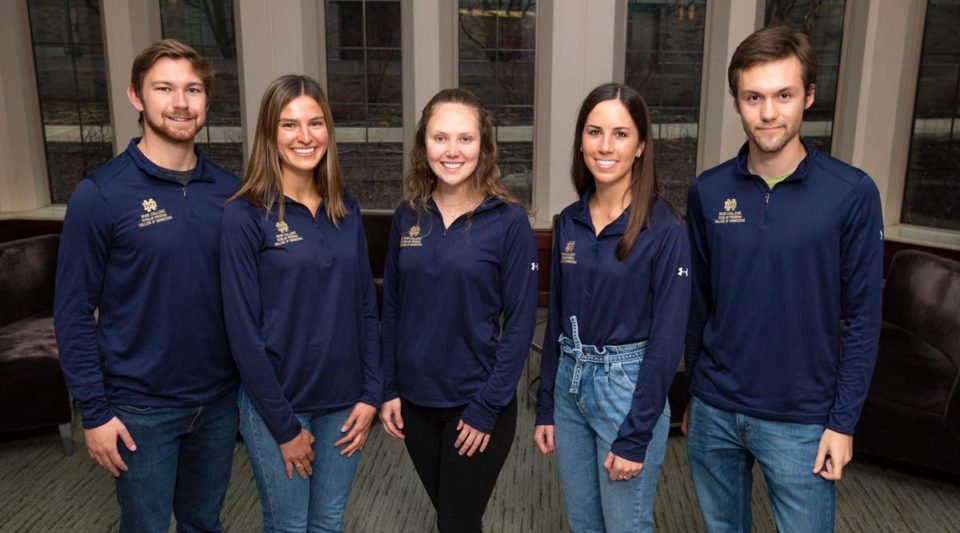Five students in the College of Engineering have completed the Notre Dame Grand Challenges Scholars Program (GCSP) — a program inspired by the National Academy of Engineering (NAE) to equip students with the skills and knowledge necessary to find innovative solutions for society’s greatest challenges.
Notre Dame seniors Collin Kemper, Emma Kerr, Tara Senn, Maria Krug, and Daniel Timofeev addressed one of the NAE’s 14 Grand Challenges for Engineering in the 21st Century, which range from making solar energy economical, engineering better medicines, and providing access to clean water.
The program, which begins in a student’s sophomore year, includes research, interdisciplinary coursework, business/entrepreneurship, multicultural experience, and community engagement.
“I worked on a buoyancy device that would allow solar panels to be placed offshore,” said Daniel Timofeev, a mechanical engineering major. “The device allows panels to avoid dangerous wave and wind loads by submerging in rough weather conditions.”
Sustainable energy also was the focus of Emma Kerr’s research. Kerr, a chemical engineering major, analyzed fueling profiles of hydrogen vehicles for the National Renewable Energy Laboratory and worked to improve battery technology with the Schaefer Research Group.
GCSP’s multidisciplinary approach encouraged Collin Kemper, a chemical engineering major, to take a class on air quality to understand the problem of water contaminants more holistically. “By learning about pollution in air, I’ve been able to understand similar patterns in water pollution,” he said.
Maria Krug, whose research focused on engineering better medicines for cancer, went to Irapuato, Mexico, for a multicultural perspective. “Chemotherapy and other cancer treatments are not widely available in many regions,” said Krug, a chemical engineering major. “The ultimate goal is to make treatment options cheaper and more widely available around the globe.”
GCSP engages communities in implementing engineering solutions. Tara Senn, a chemical engineering major, advocated for pocket forests on empty lots in South Bend neighborhoods. “We optimize the type and location of these trees to maximize their cooling effects while respecting the local ecosystem,” she said.
After graduation, the students plan to pursue careers in the clean energy sector, pharmaceutical and chemical distribution industries, and academia.
“Like many before them, this year’s graduating Grand Challenges Scholars have jump-started their impact on the world by their participation in the program,” said Kerry Meyers, assistant dean for student development in the College of Engineering and director of the Notre Dame Grand Challenges Scholars Program.
“We look forward to seeing them flourish and make a difference in the years ahead.”
— Karla Cruise, Notre Dame College of Engineering
